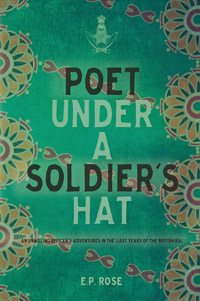Author, sculptor, and poet Elizabeth Rose received more than a dozen awards for her first book—her father’s story—Poet Under A Soldier’s Hat (2015). Her second nonfiction release, The Perfect Servant…Nope (2018), chronicles her years caring for her husband after his diagnosis of Parkinson’s Disease. You’ll find Liz on Facebook and at GalisteoLiz.com. See all of her books on her Amazon author page, and for more about her writing, read the 2015 SWW interview.
 What is at the heart of The Perfect Servant…Nope?
What is at the heart of The Perfect Servant…Nope?
People speak for the sufferer—Parkinson’s Disease in my husband’s case—but what of the caregiver? Who speaks for them? By sharing our story, our private horrors, my hope is my voice will be an advocate for the plight of us Caregivers. Without any training, we are forced by circumstance to take on the 24-hour care of our loved ones. Strong, feeble, old, young, rich or poor, caregiving is a soul-body-marriage and bank-account-breaker. I want to voice all those taboos people fear to speak.
When readers turn the last page in the book, what do you hope they’ll take away from it?
Forget giving advice such as “take care of yourself” and other irritating platitudes. What I, as a caregiver, cried for was practical and financial help for respite, some training to make our lives easier, and actual hands-on support. Isolated social pariahs, society needs to hear us.
You began sharing your caregiving journey on your blog in 2016. How did the book itself come together?
In order to reach a wider audience, I realized if I wrote at least 1000 words a week, in 18 months I’d have enough material for a book. I decided to edit only glaring grammatical errors and spelling mistakes so as not to lose the raw passion that breaks through the writing. The agonizing facts speak for themselves. By leaving the blog posts as they were written, and in order, readers can travel the daily agonizing ups and downs along with us, and so gain better understanding.
When did you know you had taken the manuscript as far as it could go?
I planned to continue until my husband died. Before our last holiday in France, my husband and I both knew that time together would be our last. And that’s what happened. He passed a month after we returned, leaving me free but grieving in an empty nest.
 What did you learn from writing your father’s story, Poet Under a Soldier’s Hat, that you were able to apply to The Perfect Servant…Nope?
What did you learn from writing your father’s story, Poet Under a Soldier’s Hat, that you were able to apply to The Perfect Servant…Nope?
The power of dialogue and the first person voice.
Of the four writing projects you’ve published—two nonfiction books, a collection of poems and artwork, and a book of children’s verse—which one was the most challenging?
My first book, Poet Under A Soldier’s Hat. As my first I knew nothing of the mysterious craft of writing (arc, POV, reversals, etc.), but also the subject, the places, and my father’s thoughts were unknown.
You began your writing career later in life. What did your mature self bring to the writing table that your younger self never could have?
As a visual and younger artist I was not involved with words. My mature self was better able to bring to writing the aesthetic sense of expression and critique I used for my sculpture.
What is the best compliment you’ve received as an author?
How much my blog helped a long-time blog visitor (Carol) and her husband to accept the hell they were living and their way of coping. Carol hadn’t lost her mind or turned into a monster—her uncharacteristic screaming outbursts and weeping were symptoms of anticipatory grieving. I used one of her responses to my blog as the foreword to The Perfect Servant…Nope.
Who are your favorite authors, and what do you admire most about their writing?
I’m attracted to unusual personal stories of unconventional people, like Rachael Joyce’s Unlikely Pilgrimage of Harold Fry and Alexander Frater’s Chasing The Monsoon, that transport me to places and experiences outside my normal life.
What writing projects do you have coming up?
My next book has the working title When Cows Wore Shoes. It records a time under Franco when people had no use for money or machines and cows really did wear shoes. The project after my book about Spain will be one about my life growing up in India, A Raj Baby Speaks. Better get busy. Too much to do, in too little time.
 KL Wagoner (writing as Cate Macabe) is the author of This New Mountain: a memoir of AJ Jackson, private investigator, repossessor, and grandmother. Kathy posts to her speculative fiction blog at klwagoner.com and writes about memoir at ThisNewMountain.com.
KL Wagoner (writing as Cate Macabe) is the author of This New Mountain: a memoir of AJ Jackson, private investigator, repossessor, and grandmother. Kathy posts to her speculative fiction blog at klwagoner.com and writes about memoir at ThisNewMountain.com.

